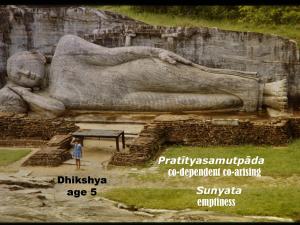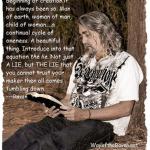Buddhism and Science on Our Mind

SR 1017
Buddhism and science on our mind. Are these three–Buddhism, science, mind–connected? Yes, if you’re a Buddhist. The Buddhist studies the mind with empirical methods and with the same impartial objectivity that modern science employs in the study of nature. But there’s a barrier blocking the road to dialogue between Buddhism and science.
What’s the barrier preventing Buddhism and science from engaging in dialogue?
In a previous post on Vedic Science, we saw that the most formidable barrier to dialogue between Hinduism and science is neither Hinduism nor science. The highest hurdle to jump is the doctrine of cultural particularism promulgated by postmodern and postcolonial philosophers. This is the complaint raised also by Buddhist scholar, B. Alan Wallace, founder of the Santa Barbara Institute for Consciousness Studies.
Postmodern and postcolonial philosophy tout “cultural particularism which asserts that different societies are culturally unique, incommensurable, and hence fundamentally unknowable by outsiders.”
Wallace objects to cultural particularism. Why? Because cultural particularism situates knowledge within its original context, denying any contextualized knowledge the right to claim universality. This doctrine of situated knowledge imprisons the intellectual insights of India to an Asian social context.
“This would imply that developed schools of Buddhism are culturally unique to the Asian societies in which they developed; therefore their theories and methods of inquiry cannot be compared to those of science” (Wallace, 2003, pp. 20-21).
In short, according to postcolonial and postmodern thought, no one living in a non-Asian context should consider the universal value of the Buddhist epistemé. Really? Such a maxim would prevent any serious dialogue between Buddhism and science. Ugh!
For the sake of discussion, let’s bracket out the doctrine of cultural particularism and proceed as if both science and Buddhism rightfully make universal claims. Let’s further assume that human minds in every cultural context share enough in common to be studied by a Buddhist scientist at work.
Buddhism and Science in Dialogue
Buddhism, better than other religious traditions, is ready to engage in dialogue with the natural sciences. Why? Well, because Buddhism is not really a religion. Rather, Buddhism is a kinda natural philosophy, sorta like science in its early stages. At least this is what Alan Wallace thinks.
“Buddhism does not define itself as a religion or as a science, and traditionally it has made no distinction between religious truths and scientific truths….Buddhism may be viewed as a form of natural philosophy” (Wallace, 2003, pp. 26-27).
Wallace wants to cancel Buddhism’s membership in the World Religions club.
Would declaring Buddhism to be a non-religion make scientists like Buddhists better? I don’t think so. A difference remains. What distinguishes Buddhist natural philosophy from Europe’s natural sciences is the subject matter of investigation and the methods of investigation.
What is Science?
Let’s ask NASA to define science.
“Science consists of observing the world by watching, listening, observing, and recording. Science is curiosity in thoughtful action about the world and how it behaves.”

The “world” scientists observe is the extended world of things and objects and processes. When the father of modernity, René Descartes (1596-1650), formulated the modern method for obtaining knowledge, he distinguished sharply between objectivity and subjectivity. To the sciences Descartes and his progeny assigned the world of objectivity to be studied rationally and empirically. To the humanities Descartes and his progeny assigned subjectivity. Within the domain of subjectivity belong religion, ethics, art, music, and history. Just check your local university catalog to see how Cartesian Western intellectual life remains in effect.
Where does Buddhism fit? Well, to date Westerners study Buddhism in the humanities along with other religions. But will a Buddhist accept being consigned to the non-scientific or subjective side of the Cartesian divide?
No. At least according to His Holiness the Dalai Lama. But, it’s complicated.
What is Buddhism?

The heart and center of Buddhist practice, the Dalai Lama tells us, is training the mind. “The Buddha said that if one trains the mind there is joy, and if the mind is undisciplined there is suffering” (Dalai Lama, 2003, p. 93).
Transforming the mind through training leads to nirvana. “If the mind is not subdued, there is saṃsāra, and if the mind is subdued, there is nirvana.” (Dalai Lama, 2003, p. 92).
So it appears that Buddhist mind training takes place solely within the domain of human subjectivity, within consciousness. This means–at least to all the Western European Cartesians among us–that Buddhism remains on the religious or subjective side of the divide.
The Mind of the Dalai Lama
Not so! At least according to the Dalai Lama. Why? Because the mind must subordinate itself rigorously to objective knowledge that rectifies misperceptions and prejudice.
“The mind is transformed when one ascertains and thoroughly acquaints oneself with fresh insights into the nature of reality, thoroughly acquaints oneself with fresh insights into the nature of reality that invalidates one’s previous misconceptions or false assumptions” (Dalai Lama, 2003, p. 96).
Is His Holiness telling us that our subjective mind should be transformed by objective knowledge? If so, would this render Buddhist mindfulness scientific? Yes, would be the Dalai Lama’s answer.
“In the course of scientific exploration and research one must also be objective … One’s research must be guided by the empirical findings themselves. The same is true in Buddhism: one must be objective…” (Dalai Lama, 2003, p. 103)
Buddhism and Science in Dialogue on Our Mind
Yes, would also be the answer of Trinh Xuan Than, a professor of astronomy at the University of Virginia.
“Buddhism is also a form of science, albeit a science of the mind. It is a contemplative science in which the mind investigates the mind” (Than, 2008, p. 31).
Than believes this readies Buddhism for fruitful dialogue with objective science.
“Can there be a basis for a dialogue between science and Buddhism? The answer is an unequivocal yes. A closer look reveals that Buddhism, just like science, relies also on the experiential method to find out about reality” (Than, 2008, p. 34).
The Buddhist looks at our mind from the inside out, from subjectivity learning from objectivity. The so-called Western scientist looks at the brain from the outside in, objectively with no interest in subjectivity.
Is there a self behind the mind?
When post-Cartesian Western scientists study the mind—actually they study the brain–, they employ objective tools and measures. They study our mental activity objectively, from a third person disinterested perspective. This method has left those of us with active interiority bereft of first person understanding. We are told by our reductionist friends that our mind is nothing more than an epiphenomenon produced by the neural activity of the brain. I’ve attempted to draw out the implications of scientizing of the mind in a series of Patheos  posts.
posts.
Did I lose my conscious mind to science?
Did I lose my free will to science?
Did I lose my self to my brain?
What I discovered is that laboratory brain researchers—the actual scientists–simply want to know how the brain works. Neurophilosophers who interpret the science, however, want us to believe that only the brain exists. Does this belief look at all like the Buddhist notion of non-self or anatta?[1]
Ann Harrington, a Harvard professor, has tried to open a gate between Tibetan Buddhist thinking about mind and the Western cognitive sciences. Even so, I still have methodlogical questions regarding the relationship of subjectivity to objectivity.
When Buddhists study the mind, they enter their subjective interior with disciplined self-reflection. On the one hand, whether disciplined or not, Buddhist meditation remains on the subjective side of the subject-object split. On the other hand, Buddhists import critical self-reflection to the extent that the very self engaged in the reflection disappears into the non-self. Does this match the disinterested objectivity of Western scientific methods?
Neurophilosophers—not brain researchers—assume that there is no self behind the mind. Buddhists want us to discover this same truth. Neurophilosophers assume what Buddhists want each of us to discover for ourselves.
Now, did I get that right?

Conclusion
The triumph of Western science since the European Enlightenment is found in its prodigious production of new knowledge about our physical world. We can only sit back in awe and applaud our heroes of science.
Yet, we dare not make the mistake of thinking that scientific knowledge is exhaustive or complete. The entire realm of subjectivity replete with the mystery of consciousness remains nearly unexplored territory in the West.
Perhaps there are treasures in the Buddhist tradition that could intrigue if not enrich us non-Buddhists.
▓

Ted Peters (Ph.D., University of Chicago) is a public theologian directing traffic at the intersection of science, religion, and ethics. Peters is an emeritus professor at the Graduate Theological Union, where he co-edits the journal, Theology and Science, on behalf of the Center for Theology and the Natural Sciences, in Berkeley, California, USA. He recently co-edited Astrobiology: Science, Ethics, and Public Policy (Scrivener 2021) as well as Astrotheology: Science and Theology Meet Extraterrestrial Intelligence (Cascade 2018). He also co-edited Religious Transhumanism and Its Critics (Lexington 2022) and The CRISPR Revolution in Science, Ethics, and Religion (Praeger 2023). Peters is author of Playing God: Genetic Determinism and Human Freedom (Routledge, 2nd ed, 2002) and The Stem Cell Debate (Fortress 2007). See his blogsite [https://www.patheos.com/blogs/publictheology/] and his website [TedsTimelyTake.com].
▓
Notes
[1] “Upon enlightenment, the ascription of intentionality dissolves in the face of a direct perception of the lack of reality of the intending ‘self’” (Gold, 2012, p. 526).Works Cited
Dalai Lama, 2003. Understanding and Transforming the Mind. In: B. A. Wallace, ed. Buddhism and Science. New York: Columbia University Press, pp. 91-106.
Gold, J., 2012. Does the Buddha Have a Theory of Mind?. In: G. R. P. a. M. L. S. James W. Haag, ed. The Routledge Companion to Religion and Science. London: Routledge, pp. 520-528.
Than, T. X., 2008. Science and Buddhism: Two Complementary Modes of Knowledge. In: P. D. Numrich, ed. The Boundaries of Knowledge in Buddhism, Christianity, and Science. Göttingen: Vandenhoeck & Ruprecht, pp. 22-43.
Wallace, A., 2003. Introduction. In: B. A. Wallace, ed. Buddhism and Science. New York: Columbia University Press, pp. 1-29.


















